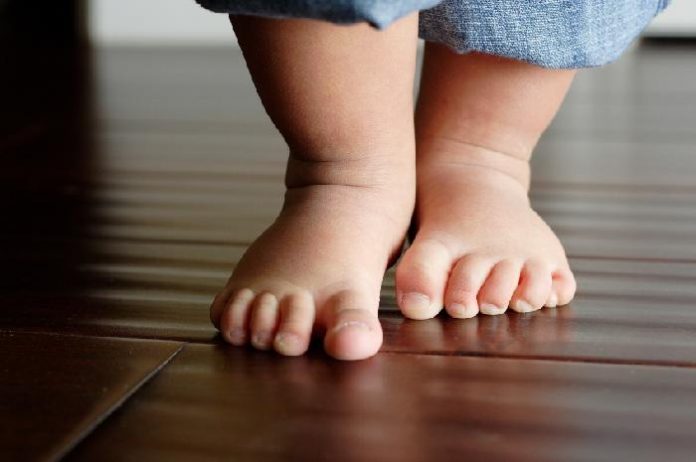Researchers in Salford are looking for parents of babies to take part in the first study its kind aimed at transforming our understanding of how young children’s feet develop as they learn to walk.
The five year Great Foundations scheme, led by research teams from the Universities of Salford and Brighton and funded by £1.5m from the William M Scholl Endowment Fund, will look in detail at how the foot develops as children start to walk independently, as well as parents’ attitudes and beliefs around infant foot health.
It consists of two studies – Small Steps which will for the first time establish an understanding of foot development as children learn to walk and Little Footnotes which will build up a picture of how people get their information about children’s foot health.
Small Steps is the most ambitious study of its kind to date. Parents of babies who are just beginning to crawl and pull themselves up are now being invited to purpose-built ‘baby spaces’ in the University of Salford’s Brian Blatchford Building and at the University of Brighton which have been designed to look as much as possible like nurseries.
Researchers will measure how the babies move using a series of 3D cameras to film them as they crawl or toddle across a short area.
Information gathered from the cameras will show how the children move during this critical stage of their development, while a pressure pad below their feet and some tools placed on the skin will help scientists understand how their foot muscles work.
For the next three years research teams will be looking for parents of children aged around three to five months and not yet standing who can visit the lab to help them carry out this work.
The team will invite parents to return over the course of a year to look at how their children’s feet continue to develop as they grow and begin to walk with more confidence.
As part of Little Footnotes, the team will talk to groups of parents and carers, as well as looking at data from online forums and mum chat rooms to find answers to questions such as what factors influence decisions around buying shoes.
They will also be talking to major footwear brands and health professionals such as Health Visitors and Podiatrists. The outcomes may be used to inform parents and carers about issues such as how and when they should buy their children’s first shoes.
Professor Chris Nester, Research Programme Leader at the University of Salford, said: “Buying your child’s first pair of shoes is such an important moment, but there’s a huge gap in our knowledge about how children’s feet develop during this crucial time.
“When it comes to answering fundamental questions like when people should buy their child’s first shoes and how feet should be measured, a lot of people base their decisions on word of mouth or turn to potentially misleading web forums because the official advice might be difficult to access.
“This research will enable us to build up a detailed understanding of children’s foot development and our findings could have huge implications in the future – by providing parents with accurate advice, helping footwear manufacturers design better products, and enabling health professionals to give appropriate support.
“Decisions made during infancy can have an effect on people for the rest of their lives, and being able to provide evidence based information to parents could help us prevent future problems for a generation which hasn’t even been born yet.”
Dr Stewart Morrison of the University of Brighton said: “There are some fundamental gaps in our understanding of where parents get their knowledge on foot health, what concerns them, and how health professionals might provide appropriate support.
“This is very timely because of the increasing emphasis on prevention rather than cure of diseases in adulthood. Getting evidence based public foot health messages to parents should be a great way to prevent future problem.”
Dr Brian Ellis, Director of the Dr William M Scholl Unit of Podiatric Development, said: “Children’s foot health is a much neglected area of research and therefore justifies the investment of £1.5m in the ‘Great Foundations’ five year programme of research. This research is designed to transform our knowledge of how children’s feet develop during the transition to walking.
“The laboratory component of the study will utilise innovative technologies to capture and measure the developmental changes which occur as the child learns to walk. The project will generate public health information which will inform: parents; medical and health care practitioners; researchers; as well as the footwear industry.”
Anyone interested in taking part in one of the University of Salford sessions should contact Dr Carina Price on 07546 984 420 or c.l.price@salford.ac.uk.







